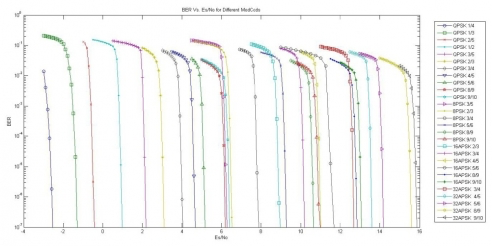Presentation of results » History » Version 14
« Previous -
Version 14/15
(diff) -
Next » -
Current version
NIESS, Marielle, 03/23/2015 07:47 PM
Presentation of results¶
We have done two kinds of test, first streaming of an HD video (1080p) and streaming of an SD video (480p).
- HD streaming
We have done the tests for different Es/N0 and the result is the same, the received video can not see, indeed here is two videos who permits to see the behavior of the channel.
In joint piece, there is two videos (720pXdB) who permits to see our result concerning streaming of HD video.
We have done a survey (mark between 0 of 5 concerning the video) over about 30 people concerning the streaming of HD videos according several Es/N0, here is the results:
| Es/N0 | 5 dB | 10dB | 20 dB | 30 dB |
|---|---|---|---|---|
| QoE (average) | 0 | 0 | 0 | 0 |
It is impossible to see the HD streaming.
The question now is, what happen ?
First here is the Ber versus the Es/N0 for differents ModCod.

In our simulation we use an QPSK ¾, we see with the previous figure that from about 5dB the transmission can be considered as quasi error free (No error of transmission), so the problem of HD streaming in our simulation is not the BER of the transmission.
One of the remaining possible issue is the bandwidth and the bit rate. Indeed when we want to do streaming of HD videos we need to have 35 Mbits/s as bit rate. Here in our simulation we configure a symbols rate as 512 k Symbols/s, we use a QPSK for the transmission, so we have about 1 Mbit/s total bit rate for the “pipe” between the hub and the station via the satellite. Therefore it is not possible to do HD streaming because we do not have enough available bit rate.
To confirm our hypothesis we have done the SD streaming simulation. Indeed with we need a smaller bit rate.
- SD Streaming
We perform the same simulations but here for an SD videos and the result are really different.
In joint piece, there is two videos (720pXdB) who permits to see our result concerning streaming of HD video.
We see that now we are able to see the video streaming. The video is almost identical for the different bit rate because we are in the quasi no error area. We are able to play the video because for an 480p streaming we need about 1 Mbit/s and that the available bandwidth for our link.
Here is a table representing the quality of experience for the videos according the Es/N0. That survey has been done over approximately 30 people.
| Es/N0 | 5 dB | 10dB | 20 dB | 30 dB |
|---|---|---|---|---|
| QoE (average) | 3.21 | 3.21 | 3.21 | 3.21 |
The videos have the same QoE because they are identical. We have a medium QoE because of the law quality of the original video.
- Conclusion
During theses test we also change the delay of transmission, when the jitter is too high we have small freeze of our stream, but it is very short and the customer are accustomed to that because it may happen during streaming on terrestrial network. A high delay implies just a higher loading of the video so the delay is not a problem too. For the loss when we are in the quasi no error area the losses are not an issue.
The only issue of streaming over satellite is the bandwidth, and we need to have an higher bandwidth than the wanted one for the streaming if we want to run others transmission on the satellite link.
